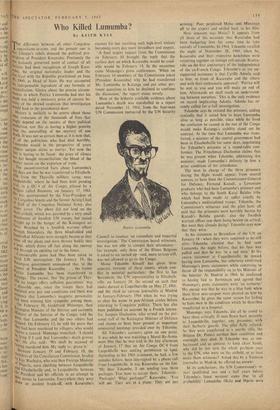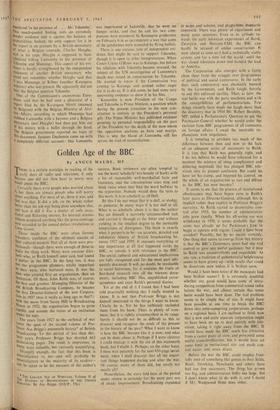Who Killed Lumumba?
By KEITH KYLE
Tilt. difference between all other Congolese „_ oppositions-in-arms and the present one is that Gbenye's rebels. demand the political pro- 4erintion of President Kasavubu. Previously the °11c jealously preserved point of contact of all factions had been recognition of Joseph Kasa- vubu, the original nationalist leader and the 11 legal with the Republic proclaimed on June 310 ,,Q, 1960, as Head of State. He was accounted the indispensable ingredient of any formula of reconciliation. Silence about the precise circum- stances in which Patrice Lumumba had met his death was held a necessary price of success be- cause of the shrewd suspicion that investigation would lead to the presidential door. History is unlikely to be severe about those Who, conscious of the thousands of lives that might depend on the success of their political mediation, saw this as having a higher priority ,Inao the unravelling of the mystery of one death. It-was not so certain then as it is now that, all the politicians who had died horribly. Lumumba would in the perspective of years ,,achieve unique status as martyr. Yet now the ',act is having to be faced: the price of silence has not bought reconciliation; the blood of the martyr insists on the expiation of truth. , The uncontroverted facts about Lumumba's last days are that he was transferred to Elisabeth- vdie from the Thysville military camp, near t!oPoldville, where he had been held pending 11141, in a DC 4 of Air Congo, piloted by a
He called Bauwcns, on January 17, 1961.
fl,c Was accompanied by the Vice-President of the Congolese Senate and the former Acting Chief oi star of the Congolese National Army, also Udder arrest. The plane did not land on the main airfield, which was guarded by a very small detachment of Swedish UN troops, but taxied straight up to the hangar of the Katangese air 1c/rec. Watched by a Swedish warrant officer kurough binoculars, the three blindfolded and "andcuffed Africans were savagely beaten as they came off the plane and were thrown bodily into
. Jeep, which drove off fast along the runway 'rid through an opening cut in the fence.
Considerable pains had thus been taken to Zt'l(1 UN interception. On January 19, the r atangese government announced that 'at the puest of President Kasavubu . . . the traitor katriee Lumumba has been transferred to v^,atanga.' The excuse, that 'the prison of Thys- liie no longer offers sufficient guarantees,' was _a Plausible one, since the troops there had mutinied over pay and conditions and there was evidence that Lumumba's magnetic personality had been winning him sympathy among them.
Kt February 10, Godefro Mtmogo then ngese Minister of the Inter id ior andn cur,rently Minister of the Interior of the Congo. told the h reSS that Lumumba and the two others had e",seaned. On February 13, he told the press that they had been murdered by villagers, who would receive a reward. Munongo remarked: 'I should lying if I said that Lumumba's death grieves 111.1!*,' He also said: 'We shall be accused of having murdered him. My reply is: prove it.' "etween January 19 and February 10, the itillenies of the Commission, headeYi. ia j bar Wachuku, whoConciliation was then Foreign Minister u Nigeria, were shuttling between Leopoldville 1,!1{1 Elisabethville and, in Leopoldville, between ue President and his officials in an attempt to i8,§ access to Lumumba. Everywhere they were 1\'en an insolent brush-off, with Kasavubu's excuses for not receiving such high-level visitors becoming every day more threadbare and suspect.
A final urgent request from the Commission on February 10 brought the reply that the earliest date on which Kasavubu would be avail- able would be February 14. In the meantime came Munongo's press conferences. 'When on February 14 members of the Commission asked [President Kasavubuj why he had transferred Mr. Lumumba to Katanga and put other per- tinent questions to him he declined to continue the discussion,' the report states tersely.
Most of the hitherto available evidence about Lumumba's death was marshalled in a report dated November 11, 1961, from the four-man UN Commission instructed by the UN Security
Patrice Luniumba
Council to conduct 'an immediate and impartial investigation.' The Commission heard witnesses, but was not able to compel their attendance— for example. only three of the fifteen Belgians it asked to see turned up--and, more serious still, was not allowed to go to the Congo.
Moise Tshombe himself has given three separate versions of these events, which con- flict in material particulars: the first to Ian Berendson, the UN representative in Elisabeth- ville, on January 18; the second on oath (hut under duress) at Coquilhalville on May 27. 1961; and the third to various journalists at Madrid in January-February 1964 when he was trying to clear his name in pan-African circles before returning to Congolese politics. There has also been published an account by a French journa- list. Jacques Duchemin, who served on the per- sonal staff of the Katangese Mibister of Defence and claims to have been present at important ministerial meetings presided over by Tshombe.
All Tshombe's accounts agree on one point. It was while he was watching a Moral Re-Arma- ment film that he was told in the late afternoon of January 17 that an Air Congo DC 4 from Leopoldville was seeking permission to hind. According to his 1964 statement, he had, a few minutes before, been interrupted by a phone call from Leopoldville. It was Kasavubu on the line. 'My dear Tshombe. I am sending you three packages. You have to accept them.' Tshombe: 'Packages! What packages?' Kasavubu: 'You will see. They are in a plane. They are just arriving.' Poor perplexed Moise sent Munongo off to the airport and settled back to his film.
How innocent was Moise? It appears from all three of his accounts that Kasavubu had been badgering him for some time to take custody of Lumumba. In 1964, Tshombe recalled the night of November 28, 1960, when he, Kasavubu and their respective henchmen were roistering together on foreign soil outside Brazza- ville on the first anniversary of the independence of the ex-French Congo. Tshombe's as yet un- supported testimony is that Cyrille Adoula said to him, in front of Kasavubu and the others and with their enthusiastic approval: 'Patrice will be sent to you and you will make an end of him. Afterwards we shall reach an understand- ing between ourselves.' This is the only evidence on record implicating Adoula. Adoula has re- cently called for a full investigation.
Tshombe says he resisted this pressure, adding cynically that it suited him to have Lumumba alive as long as possible, since while he lived the confusion he caused in the rest of the Congo would make Katanga's stability stand out by contrast. At the time that Lumumba was trans- ferred, a minister of the central government had been in Elisabethville for some days, negotiating for Tshombe's presence at a round-table con- ference. The Frenchman Duchemin claims that he was present when Tshombe, addressing this minister, made Lumumba's delivery to him a prior condition of his attendance.
The man in charge of the three prisoners during the flight would appear, from several sources, to have been the Commissioner-General for Defence, Fernand Kazadi, a Lovanium graduate who had been Lumumba's prisoner and who belongs to the South Kasai Baluba tribe which had been made to suffer cruelly by Lumumba's undisciplined troops. Tshombe, the Commission's witnesses and the pilot have all said that the prisoners were horribly beaten by Kazadi's Baluba guards: also the Swedish warrant officer saw them being beaten on arrival. But were they already dying? Tshombe says now that they were.
In his statement to Bercndson of the UN on January 18-- when they were supposed to be still alive --Tshombe claimed that he had seen Lumumba the night before, that his face was puffed and that he was 'in a sad state.' In his sworn statement ,at Coquilhatville, he denied having seen Lumumba, but otherwise confirmed Munongo's press statements while contriving to throw all the responsibility on to his Minister of the Interior. At Madrid in 1964. he confessed to having lied to Berendson and agreed that Munongo's press statements were 'an scenario.' 'His excuse was that he was in a blue funk when these three near-corpses were planted on him by Kasavubu; he gives the same reason for failing to have men in the condition which he describes transferred to a hospital.
Munongo. says Tshombe, did all he could to have these critically ill men flown back instantly to Leopoldville, together, one presumes. with their barbaric guards. The pilot flatly refused. So they were transferred to a nearby villa, the Belgian Dr. Pieters verified their condition and overnight they died. If Tshombe was so em- barrassed and so anxious to keep clean hands, why did he not turn the whole problem over to the UN, who were on the airfield, or at least make them witnesses? Asked this by a Tunisian journalist in Madrid, he offered no answer.
In' its conclusions, the UN Commission's re- port (published two and a half years before Tshombe's latest version) states that 'in all probability' Lumumba, Okito and Moot° were
Murdered 'in the presence of . . . Mr. Tshombe: This much-quoted finding rests on extremely slender evidence and is against the balance of Probabilities. Indeed, the only support for it in the report is an account by a British mercenary of what a Belgian comrade, Charles Huyghe, said in his cups. Huyghe is supposed to have admitted killing Lumumba in the presence of Tshombe and Munongo. This aspect of his evi- dence is hardly strengthened by the independent statement of another British mercenary, who Could not remember whether Huyghe said that it was Munongo or Kibwe (another Katangese Minister) who was present. He apparently did not hear the Belgian mention Tshombc. One of the Commission's anonymous Euro- peans said that he had seen a photostat of a by filed by the Katangese SOrctd (manned °Y Belgians) with the Belgian Ministry of Afri- can Affairs, according to which Munongo had stabbed Lumumba with a bayonet and a Belgian mercenary (not Huyghe) had then put him out of his misery with a bullet through the head. The Belgian government reported no trace of this document. Jacques Duchemin came up with 4 Completely different account: that Lumumba was imprisoned at Jadotville, that he went on hunger strike, and that he and his two corn- panions were murdered by Katangese gendarmes on February 6 in so incompetent a way that some of the gendarmes were wounded by flying bullets.
There is one curious item of independent evi- dence that might be said to support Tshombe, though it is open to other interpretations. When Conor Cruise O'Brien was in Katanga. but before his relations with Tshombe became strained, the subject of the UN investigation of Lumumba's death was raised in conversation by Tshombe. He wanted to know if the Commission was coming to Katanga and seemed rather eager for it to do so. If it did come, he had some very interesting evidence to show it in his files.
Kasavubu is now President of the Congo and Tshombc is Prime Minister, a position which during the present transition to the new con- stitution is entirely in the President's personal gift. The Prime Minister has published evidence pointing to personal responsibility on the part of the President for the death of the man whom the opposition acclaims as hero and martyr. This is why the blood of Lumumba still lies across the trail of reconciliation.



































 Previous page
Previous page